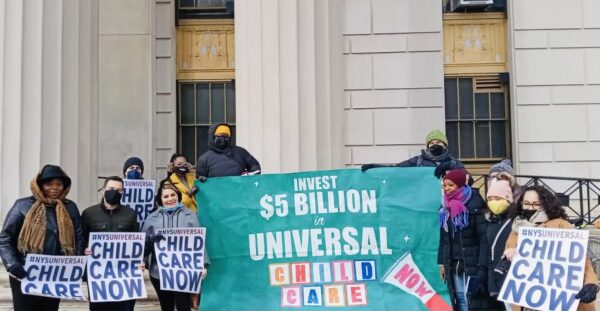Does Education Continue for Kids in Respit Care Nys
New York State Budget Falls Short on Child Care Investments
April 19, 2022 by

While NYS took steps forward, much more is needed to create universal child care.
Governor Hochul recently released the New York State budget for 2023. This year's NYS budget invested more in child care than previous years; however, it still falls short in making child care truly accessible. We acknowledge the $7 billion over the next four years that has been allocated towards child care—more than double the previous budget's support for child care. However, we called for $5 billion in 2023 alone to make child care accessible and affordable for families and to properly compensate providers.
The budget does not provide universal child care, which would mean access to child care for all families who want and need it. Child care should be a right—it should not be conditional based on means testing, employment or immigration status.
Child care-related highlights and issues from the budget include:
- The budget raises the maximum income eligibility from 200% to 300% of the federal poverty level (from an annual income of $55,500 to $83,250 for a family of four). This change makes over half of young children in New York eligible for subsidies.
While the number of parents/caregivers who can apply has significantly increased, funds to expand the number of vouchers for subsidized child care do not match the expanded pool of potential applicants. This means that, because of insufficient funds, not all eligible families will be able to get vouchers. The lack of full investment will continue to result in families experiencing long waitlists and parents who are eligible for vouchers paying exorbitant child care fees.
- Child care subsidies have increased and will now more closely reflect the true market rate of child care (up to the 80th percentile), creating a larger pool of child care centers and providers that families with vouchers can access.
- The $343 million invested in child care stabilization grants will help child care providers cover operation costs and offer short-term financial support for providers, but fails to secure a consistent wage increase for underpaid child care educators.
- We are deeply disappointed that children who are undocumented will not be eligible for child care. Chalkbeat estimates that this excludes approximately 5,000 children in New York State. Furthermore, undocumented parents of children who are citizens are unlikely to apply for child care, even though their children are eligible. Parents who are undocumented may avoid completing the paperwork because they fear for their safety and ability to stay in the country. Immigrant families are impacted by family separation through the family policing system and by ICE—both systems that threaten, surveil and separate families.
- The new budget does not end means testing (by eliminating income requirements that make parents prove they need assistance). While the income eligibility limit was increased, it still doesn't reflect the cost of living in New York City and will continue to exclude families who need child care support. Additionally, maintaining means testing upholds an existing oppressive dynamic: if you make a dollar above the limit, you lose eligibility, which prevents families from increasing their income and resources.
- The budget does not end work requirements as a criterion for child care eligibility, which means that access to child care continues to be dependent on employment. This doesn't reflect the experiences and circumstances of all families. Additionally, lack of access to child care makes it difficult for parents to get a job, as they may not have time to search and apply for jobs and complete interviews.
We extend deep appreciation to everyone—including the parents, child care providers, organizers, Alliance for Quality Education, Empire State Campaign for Child Care (ESCCC), community organizations, Senator Brisport, Assembly Member Hevesi and Senator Ramos—who worked hard to achieve this historic milestone in investing in child care. This is the first time parents and child care providers have come together in New York State to advocate for investment in child care. Now the conversation about universal child care has expanded and is taking place on a broader level in communities, in the media and with elected representatives. Together, we can build upon this foundation to advocate for more transformative changes.
Throughout 2022, Rise has advocated for investments in child care that include all families. We'll continue to raise our voices by organizing, raising awareness and mobilizing parents as part of the movement with ESCCC. Rise is now focused on influencing how the child care investments will be allocated, including post-budget legislation, upcoming NYC-level budget decisions and city-level decisions about implementation.
Child care is a family policing issue. We need to ensure the budget and future wins reflect the needs of parents impacted by family policing. Rise will advocate for child care and respite care unaffiliated with the family policing system, expanded child care hours and prioritization of child care access for families and communities highly impacted by ACS. Rise is now conducting a survey to gather more information about parents' experiences and vision for child care, which will inform our advocacy. We recognize that the State has taken a step toward expanding child care access—and also recognize the enormous work that still needs to be done. As we move forward, we are hopeful and committed to creating a system of child care that includes all families and prevents family policing system involvement.
dannevigarkly1949.blogspot.com
Source: https://www.risemagazine.org/2022/04/nys-budget-falls-short-on-child-care/
0 Response to "Does Education Continue for Kids in Respit Care Nys"
Post a Comment